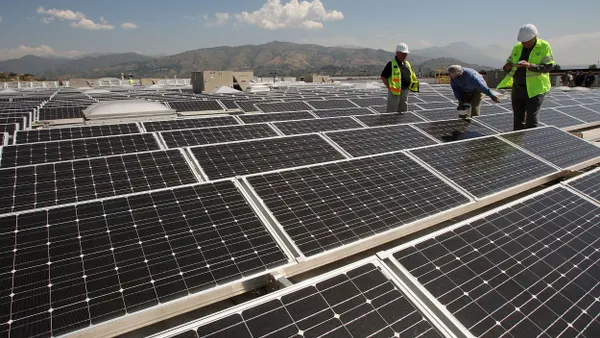Dive Brief:
- Despite the potential for natural gas constraints, the grid operator responsible for New England said the region should have adequate power supplies to meet customer demand on even the coldest days, MassLive reports.
- However, ISO New England said this week that it has identified about 4,000 MW of gas-fired generation that on any given day is at risk of not receiving fuel, an indication of the region's constrained pipes.
- The ISO said it has worked with stakeholders to design a short-term winter reliability program that could bring more oil-fired generation online, to ensure reliability until performance incentives go into effect in 2018.
Dive Insight:
New England will have adequate power supplies this winter, but in order to make that assurance, the grid operator has had to put in place a short-term reliability program that includes incentives for generators using oil and liquefied natural gas.
“Winter has become a challenging time for New England grid operations,” said Vamsi Chadalavada, executive vice president and COO of ISO New England.
“To address the serious challenge these constraints create for reliable power system operation and to ensure that generators can run during times of system stress, ISO New England will again employ a Winter Reliability Program to incentivize oil-fired generators and generators that can access liquefied natural gas to procure sufficient fuel before winter begins," Chadalavada said in a statement. "The program has been a key factor in our ability to keep the lights on the last two winters."
The ISO said it has identified more than 4,000 MW of gas-fired generation that is at risk of not receiving fule on any day. "Especially during the coldest weeks of the year, the natural gas infrastructure in New England is inadequate to meet the demand for gas for both heating and power generation," Chadalavada said.
The ISO is predicting peak demand, assuming normal temperatures, of 21,077 MW. In extreme weather of 2 degrees, peak demand would rise to 21,737 MW. Both of the predictions account for 1,663 MW in energy savings from energy-efficiency measures acquired through the region’s Forward Capacity Market (FCM).
The grid has more than 31,000 MW of resources with an FCM capacity supply obligation to be available, including: 29,932 MW of generation; 587 MW of demand-response resources; and 1,226 MW of imports. But 687 MW is unavailable due to maintenance or other reasons.














